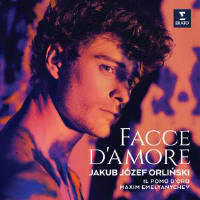Texte paru dans: / Appeared in: |
|
|
Outil de traduction (Très approximatif) |
|
|
Reviewer:
Alexandra Coghlan
Jakub Józef Orliński made his solo debut a year ago with a collection of sacred works (‘Anima sacra’ – Erato, 12/18), but for his second recording the Polish countertenor, Gramophone’s new Young Artist of the Year, steps firmly into the world of the secular with a love-themed recital of arias by composers ranging from Cavalli to Hasse. Once again Orliński has teamed up with the musicologist Yannis François to put together a programme, and once again it’s a winner. Alongside the obvious headliners – the mad scene from Handel’s Orlando, ‘Pena tiranna’ from his Amadigi and Ottone’s plaintive ‘Voi che udite’ from Agrippina – are a whole host of little-knowns, including more than a handful of premieres. There are attractive arias by Bononcini, Boretti and Orlandini but it’s music by Luca Antonio Predieri (a near contemporary of Handel’s) that really hits the mark. It’s hard not to be charmed by the tripping prettiness of ‘Finche salvo è l’amor suo’, whose accompanying strings chatter and trill like a forest of accompanying birds, while the elegant lines of ‘Dovrian quest’occhi piangere’ (also from Scipione) are charged with emotions held close beneath the surface. Predieri’s gentle lyricism and clean lines suit Orliński’s soft-grained voice well. He’s no convincing bad boy – we get the vulnerability and fragility of Handel’s Orlando but never his murderous intensity; and while Orlandini’s Nero may command Poppea to love him in furious volleys of semiquavers and plunging melodic leaps and dives, Orliński gives us only polite requests – but this supple and sweet-toned instrument has plenty to bring elsewhere. Endimione’s lovely ‘Lucidissime face’ yearns and keens with emotion and expression, Ottone frets with exquisite purity (occasionally gripped moments of vibrato aside), and the sustained, legato lines of Bononcini’s brooding ‘Infelice mia costanza’ are beautifully shaped. Il Pomo d’Oro offer all their usual technicolour support and showmanship under Maxim Emelyanychev. A barnstorming account of Matteis’s Ballo dei Bagatellieri (complete with castanets) drags the listener on to the dance floor for everything from a lilting chaconne to a frenzied gigue.
|
|




